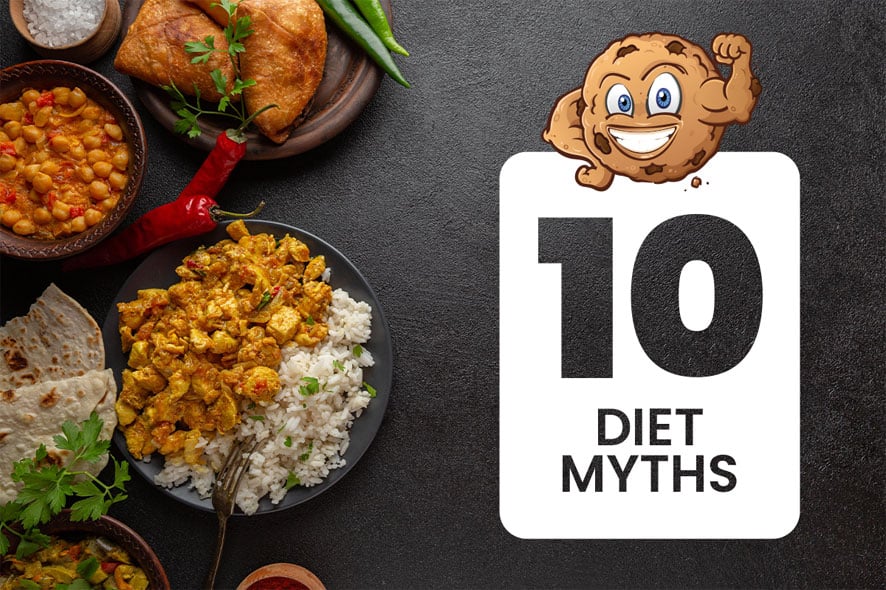- Eating fruit after 6 in the afternoon encourages fat growth
The fruit provides us with the same amount of calories and carbohydrates in the morning and at night.
During the day we are indeed more active, and we are more likely to immediately use the energy it provides. However, even when we sleep or our activity decreases, our body continues to function and our brain needs sugar.
The key is to eat the right amounts, especially to have a healthy balanced diet, since eating 2-3 recommended servings of fruit won’t help us if we consume more calories than necessary.
- Banana, mango and grapes make us fat
Some fruits indeed have a higher concentration of carbohydrates or a higher glycemic index, which are used in certain diets designed for weight gain. Nevertheless, no food is fattening if it is not consumed in excess, but simply as a part of a balanced diet.
If your body needs 2,000 calories a day and you consume 2,500 calories from mangoes alone, of course, you will gain weight because excess calories accumulate as fat.
However, if you have a balanced diet and eat 2-3 servings of fruit, be it bananas, mangoes, or grapes, but burn the same or higher amount of calories than you eat, you will not gain weight.
- Gluten-free food is less fattening
Gluten is a protein found mainly in wheat, which is widely used in the food industry, especially in the production of foods such as bread, pasta, cakes, cakes, as it gives them texture.
Celiac or gluten intolerant people have been forced to eliminate this protein from their diet and stop eating bread, pasta, cakes, pastries, and everything that is made from wheat and its derivatives. In consequence, they often lose weight. Celiac disease is characterized by atrophy of the intestinal villi where nutrients are absorbed and people suffering from this pathology tend to lose a lot of weight. Consequently, it is not gluten itself that “fattens”, but the elimination of certain food from a diet or the lack of proper assimilation of nutrients, which leads to weight loss.
However, many people think that these foods are healthier, which is not necessarily the case. Quite often, it is necessary to add more fats or sugars to give them the desired flavor and texture.
- The vegetarian diet is ideal for losing weight
A vegetarian diet is made up of foods of plant origin, such as cereals, legumes, fruits, vegetables, etc. As with any type of diet, it is not the food that you consume that makes you gain weight, but excess calories.
- Lemon burns fat
Lemon cannot dilute the fat stored in the body. It doesn’t work the same way as a detergent! The only way to eliminate the fat accumulated in your body’s reserve is by using it as energy.
- Sugar-free drinks make you fat just like sugary ones
Although carbonated drinks are not healthy, it is true that sugar-free drinks are sweetened with synthetic sweeteners and do not provide calories. It does not mean that they are healthier – they simply do not contain sugar.
- Coffee produces cellulite
Cellulite or orange peel is connected with genetics, in addition to a poor diet (excess of saturated fats, trans and simple sugars, what we discussed talking about an anti-cellulite diet) and a lack of physical activity.
- Natural and healthy foods can be eaten in any quantity
Just because a food is natural and healthy does not mean that it does not encourage weight gain. All foods provide calories and if consumed in enormous amounts, the excess accumulates as fat. It is not the same to consume 2/3 pieces of fruit as 8/9 pieces, nor is it the same to consume a cup of brown rice and a full pot.
It is one of the myths concerning superfoods: in reality, no matter how beneficial they may be, they must be consumed in moderate portions and be a part of a balanced diet.
- Whole foods make you less fat
Whole-grain food has the same or even higher amount of calories than regular food. It is recommended because it is healthier, provides more fibre and micronutrients, but does not necessarily have fewer calories.
- Vitamins make you fat
Vitamins are micronutrients that are in the food, which are required to carry out all the chemical reactions taking place in the body. When we need an extra dose of vitamins we turn to supplements. Vitamins do not provide calories, although they are necessary for energy metabolism. That is how our body uses fats, proteins and carbohydrates to generate energy. That’s just one of many myths concerning vitamins.
Sources:
- Vegetarian Diets and Weight Reduction: a Meta-Analysis of Randomized Controlled Trials
- Evaluation of an Eight-Week Whole-Food Plant-Based Lifestyle Modification Program
- Celiac disease and the gluten-free diet: consequences and recommendations for improvement
- Free Sugar Content in Pre-Packaged Products: Does Voluntary Product Reformulation Work in Practice?

